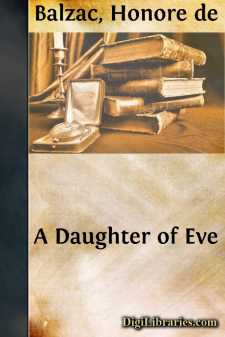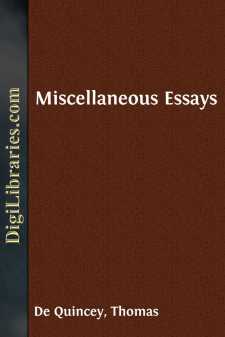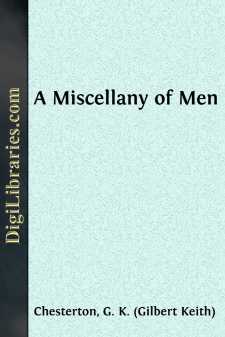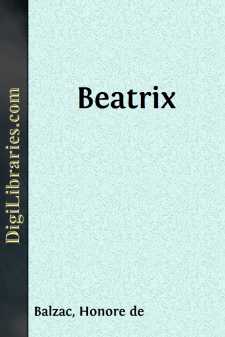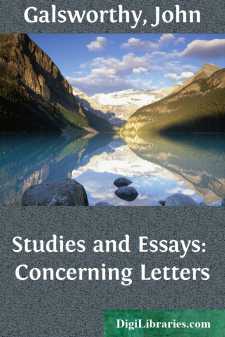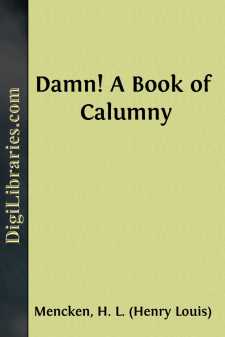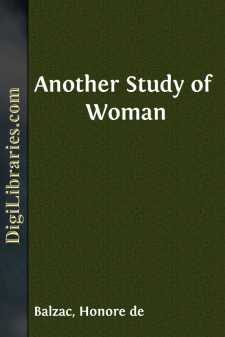Literary Collections
- American 84
- Ancient, Classical & Medieval 14
- Asian 1
- Australian & Oceanian 1
- Canadian 55
- Continental European 121
- English, Irish, Scottish, Welsh 179
- Essays 160
- General 24
- Letters 46
- Middle Eastern 1
Literary Collections Books
Sort by:
by:
Honore de Balzac
CHAPTER I. THE TWO MARIES In one of the finest houses of the rue Neuve-des-Mathurins, at half-past eleven at night, two young women were sitting before the fireplace of a boudoir hung with blue velvet of that tender shade, with shimmering reflections, which French industry has lately learned to fabricate. Over the doors and windows were draped soft folds of blue cashmere, the tint of the hangings, the...
more...
ON THE KNOCKING AT THE GATE, IN MACBETH. From my boyish days I had always felt a great perplexity on one point in Macbeth. It was this: the knocking at the gate, which succeeds to the murder of Duncan, produced to my feelings an effect for which I never could account. The effect was, that it reflected back upon the murder a peculiar awfulness and a depth of solemnity; yet, however obstinately I...
more...
by:
Bernard Shaw
FOREWORD A revolutionist is one who desires to discard the existing social order and try another. The constitution of England is revolutionary. To a Russian or Anglo-Indian bureaucrat, a general election is as much a revolution as a referendum or plebiscite in which the people fight instead of voting. The French Revolution overthrew one set of rulers and substituted another with different interests and...
more...
THE SUFFRAGIST Rightly or wrongly, it is certain that a man both liberal and chivalric, can and very often does feel a dis-ease and distrust touching those political women we call Suffragettes. Like most other popular sentiments, it is generally wrongly stated even when it is rightly felt. One part of it can be put most shortly thus: that when a woman puts up her fists to a man she is putting herself...
more...
by:
Honore de Balzac
CHAPTER I. THAT WHICH WAS LACKING TO PIERROTIN'S HAPPINESS Railroads, in a future not far distant, must force certain industries to disappear forever, and modify several others, more especially those relating to the different modes of transportation in use around Paris. Therefore the persons and things which are the elements of this Scene will soon give to it the character of an archaeological...
more...
PART 1 — CAMBRIDGEI"The cow is there," said Ansell, lighting a match and holding it out over the carpet. No one spoke. He waited till the end of the match fell off. Then he said again, "She is there, the cow. There, now." "You have not proved it," said a voice. "I have proved it to myself." "I have proved to myself that she isn't," said the voice. "The...
more...
by:
Honore de Balzac
I. A BRETON TOWN AND MANSION France, especially in Brittany, still possesses certain towns completely outside of the movement which gives to the nineteenth century its peculiar characteristics. For lack of quick and regular communication with Paris, scarcely connected by wretched roads with the sub-prefecture, or the chief city of their own province, these towns regard the new civilization as a...
more...
by:
John Galsworthy
A NOVELIST'S ALLEGORY Once upon a time the Prince of Felicitas had occasion to set forth on a journey. It was a late autumn evening with few pale stars and a moon no larger than the paring of a finger-nail. And as he rode through the purlieus of his city, the white mane of his amber-coloured steed was all that he could clearly see in the dusk of the high streets. His way led through a quarter but...
more...
PATER PATRIÆ If George Washington were alive today, what a shining mark he would be for the whole camorra of uplifters, forward-lookers and professional patriots! He was the Rockefeller of his time, the richest man in the United States, a promoter of stock companies, a land-grabber, an exploiter of mines and timber. He was a bitter opponent of foreign alliances, and denounced their evils in harsh,...
more...
by:
Honore de Balzac
ANOTHER STUDY OF WOMAN At Paris there are almost always two separate parties going on at every ball and rout. First, an official party, composed of the persons invited, a fashionable and much-bored circle. Each one grimaces for his neighbor's eye; most of the younger women are there for one person only; when each woman has assured herself that for that one she is the handsomest woman in the room,...
more...


